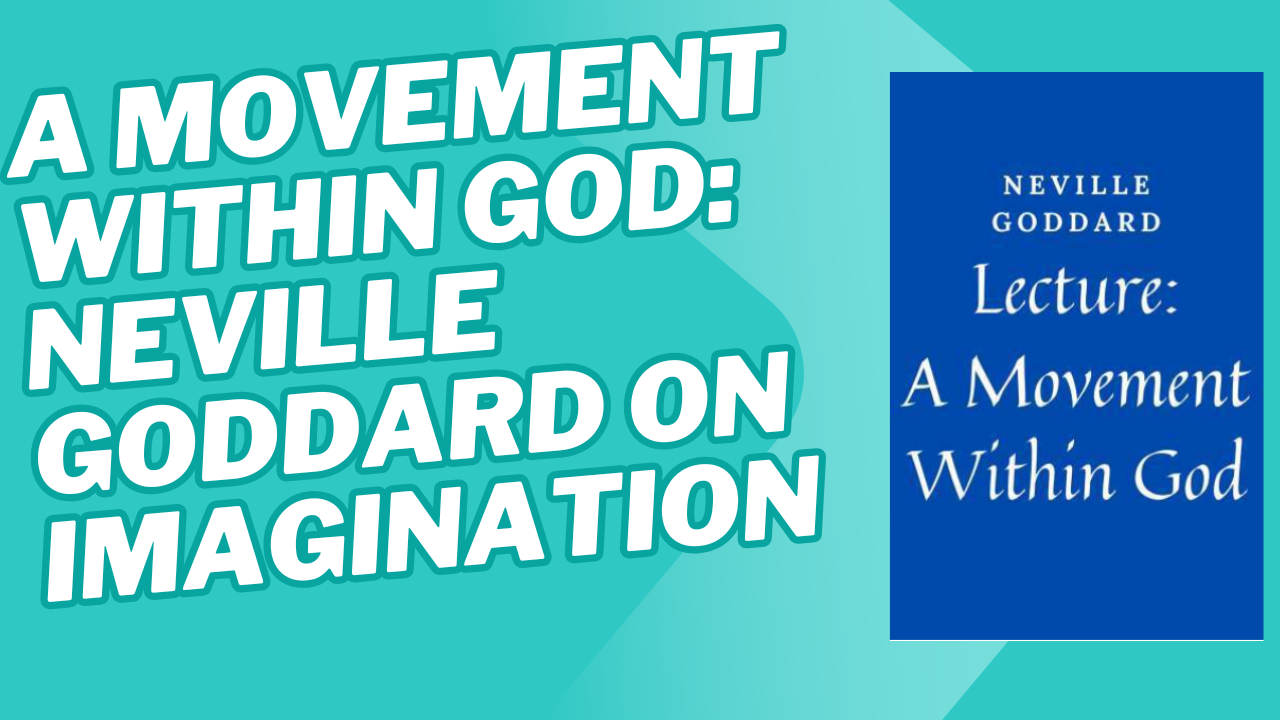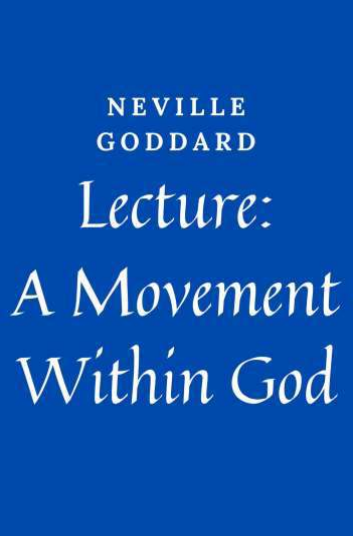
Neville Goddard’s lecture explores the idea that reality is a product of our imagination. He posits that everything exists within God, and humans, as manifestations of God, have the power to shape their experiences through conscious imagining. Goddard asserts that we are not victims of external forces but active creators of our own reality, choosing the states we occupy. He equates Jesus Christ with the individual’s own “wonderful human imagination,” urging listeners to realize their inherent divine power. The lecture encourages listeners to intentionally and deliberately move their imagination toward desired states to affect tangible changes in their lives. Goddard claims people are wearing “masks,” and imagining their own reality until they awaken and understand the power of the imagination.

- What is the core message of Neville Goddard’s teachings in “A Movement Within God?”
- The core message is that you are not a victim of external forces or a deity separate from yourself. You are God, or rather, your Imagination is God. Everything you experience is a result of your own consciousness, your own movements within God. You have the power to change your circumstances by deliberately imagining and occupying the state you desire.
- How does Neville Goddard define God and its relationship to human beings?
- Goddard equates God with Imagination, specifically your own “wonderful human imagination.” God is not a separate entity but the very essence of your being. He teaches that “God became man that man may become God,” meaning that Imagination took human form, allowing humans to realize their own divine power and ultimately become all Imagination. He states that there is only one God who is playing all of the parts, and in the end, you will know that you are the light, that you are Spirit, that you are God, from personal experience.
- What is the significance of the “play” that Goddard refers to?
- The “play” is a metaphor for the entire human experience, encompassing all possibilities – joy, sorrow, good, and evil. Before the play began, we, as a unified being (Elohim), conceived of it and chose to participate. Each individual is now playing a role, wearing a “mask,” and often unaware of their true identity as God. The purpose of the play is to experience and ultimately return to the unified being, enhanced by the journey.
- How does one change their current circumstances according to Goddard’s teachings?
- Change is achieved through conscious and deliberate use of imagination. Identify the state you wish to occupy, and then vividly imagine yourself already in that state, feeling and experiencing it as real. Persist in this imagined state until it feels natural. This “movement within God” will eventually manifest as a change in your external reality. He gives the example of his brother Victor, who moved his imagination in order to see “J.N. Goddard and Sons” on the marquee, rather than the existing “F.N. Roach and Company”. He did this every day until the idea was fixed in his mind’s eye.
- What does Goddard mean when he speaks of “Jesus” or “Joshua?”
- Goddard is not referring to a historical figure as taught by traditional churches. Instead, “Jesus” or “Joshua” represents the Christ within you, your own divine Imagination, the power that saves. It’s the ability of your own being to become aware, remember your true nature, and transform your reality.
- What is the “mask” that Goddard refers to?
- The “mask” represents the limited identity we assume within the “play” of life. It’s the illusion of separation, the belief that we are distinct individuals disconnected from each other and from God. The mask obscures our true nature as the one being playing all the parts.
- What is the Law of Identical Harvest?
- The Law of Identical Harvest is the concept that you will reap what you sow. It suggests that your external circumstances are a direct reflection of your internal state, particularly your thoughts and imaginations. If you cultivate positive and desired states within your imagination, you will ultimately experience corresponding results in your life. He imagined himself into what he is, and he can imagine himself into what he wants to be, always becoming what he imagines himself to be, be it good, bad, or indifferent.
- Why does Goddard claim that his teachings are often met with rejection?
- Goddard suggests that when people are introduced to the idea that they can consciously create their reality through imagination, they may become disillusioned and reject the teacher if they fail to achieve their desired outcomes. This is because they may not fully understand or apply the principles correctly, leading to frustration and blame. The teacher, who invited them to dream, then risks rejection.
A Movement Within God: A Study Guide
Quiz
Answer the following questions in 2-3 sentences each.
- According to Goddard, where does everything that takes place in your world originate?
- What does Goddard mean when he says, “God became Man that Man may become God?”
- Explain Goddard’s concept of “falling into a state.” How does one do it, and what are the implications?
- How does Goddard differentiate between the “Jesus” of the churches and the “true story of Jesus”?
- What is the significance of the “mask” in Goddard’s teachings?
- How does Goddard use his brother Victor’s story as an example of moving in imagination?
- According to Goddard, what role does Imagination play in our daily lives, even when we are unaware?
- What does Goddard mean by the phrase, “the law of identical harvest”?
- What is the ultimate goal or outcome of the “play” that Goddard describes?
- Why, according to Goddard, do teachers who invite others to dream consciously often face rejection?
Quiz Answer Key
- Everything that takes place in your world originates from a movement within God, who is not a deity outside oneself. This movement is driven by our imagination and the states we choose to occupy, knowingly or unknowingly.
- Goddard means that Imagination (God) became each individual (Man) so that the individual can realize their potential to become all Imagination (God). It signifies the potential within each person to realize their divine nature and creative power.
- “Falling into a state” refers to unknowingly or unwittingly adopting a particular mindset or belief, often influenced by external sources like news or media. This state then manifests in one’s reality, highlighting the power of suggestion and the importance of conscious awareness.
- Goddard sees the “Jesus” of the churches as a figure distorted by dogma and ritual, far removed from the original message. The “true story of Jesus” is about the inherent divinity within each individual, the power of imagination, and the journey of self-discovery and salvation.
- The “mask” represents the limited identity and roles we assume in the play of life, obscuring our true divine nature. Recognizing the mask allows us to see beyond appearances and understand the interconnectedness of all beings as aspects of the one God.
- Victor moved in his imagination by repeatedly visualizing “J.N. Goddard and Sons” on the marquee of a building he desired. Through consistent imaginal acts, Victor was able to manifest his desire into reality.
- Imagination plays a pervasive role, influencing our desires, purchases, and overall perception of reality. When we are not consciously directing our imagination, we become susceptible to external suggestions and fall into states that may not serve us.
- The “law of identical harvest” means that what you sow (imagine and believe) is what you reap (experience in your reality). It emphasizes the direct relationship between our inner world of thoughts and beliefs and the outer world of our experiences.
- The ultimate goal is the return to unity with the Lord Jesus Christ, where all individual experiences are resolved into perfect harmony, and each being expands beyond what they were prior to the play.
- Teachers who invite others to dream consciously face rejection because those who are not yet skilled at directing their imagination may become disillusioned when their initial attempts don’t immediately yield results. This disillusionment can lead to resentment towards the teacher who inspired them to dream.
Essay Questions
Consider the following questions and develop well-structured essays.
- Explore and analyze Goddard’s concept of God. How does he redefine traditional notions of God, and what implications does this redefinition have for individual empowerment?
- Discuss the significance of imagination in Goddard’s philosophy. How does he elevate imagination from a mere mental faculty to the operant power of God, and what are the practical applications of this understanding?
- Examine Goddard’s interpretation of the story of Jesus Christ. How does he deconstruct traditional religious narratives, and what alternative understanding does he offer?
- Analyze Goddard’s metaphor of the “play” and the “mask.” How do these concepts illuminate the nature of reality, human identity, and the path to self-realization?
- Evaluate the potential benefits and challenges of consciously directing one’s imagination, according to Goddard’s teachings. What are the ethical considerations and potential pitfalls of this practice?
Glossary of Key Terms
- Imagination (Jesus Christ): The creative power of God within each individual, the faculty through which reality is shaped.
- Movement Within God: The process of consciously shifting one’s state of being through imaginal acts.
- State: A particular mindset, belief, or feeling that one occupies, which influences their experiences and reality.
- Mask: The limited identity or role that an individual assumes in the play of life, obscuring their true divine nature.
- Play: The collective experience of humanity, a drama conceived by God (the collective imagination) in which individuals play various roles.
- Elohim: A compound unity of one made up of others
- Operant Power: The active force within each individual to manifest and create.
- The Law of Identical Harvest: The principle that what you sow (imagine and believe) is what you reap (experience in your reality).
- Falling into a State: Unconsciously adopting a mindset or belief, often influenced by external suggestions.
- Unity: The state of being one with God, the ultimate goal of the journey where all are gathered together into a harmonious whole.

0 responses on "A Movement Within God: Neville Goddard on Imagination"